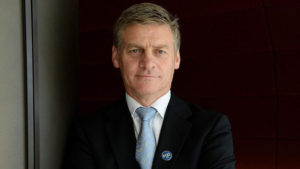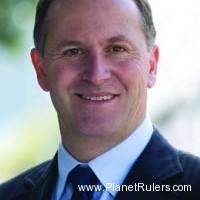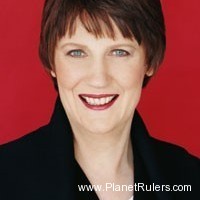Jacinda Ardern, Prime Minister of New Zealand (since Oct 26, 2017)

After graduating from the University of Waikato in 2001, Ardern began her career working as a researcher in the office of Prime Minister Helen Clark. She later worked in the United Kingdom as a policy advisor to Prime Minister of the United Kingdom Tony Blair. In 2008, she was elected President of the International Union of Socialist Youth. Ardern became a list MP in 2008, a position she held for almost ten years until her election to the Mount Albert electorate in the 2017 by-election, held on 25 February. She was unanimously elected as Deputy Leader of the NZ Labour Party on 1 March 2017 following the resignation of Annette King.
Ardern became Leader of the Labour Party on 1 August 2017 when Andrew Little resigned from the position following a historically low poll result for the party. In the general election of 23 September 2017, the Labour Party won 46 seats (a net gain of 14), putting it behind the National Party led by Bill English, which won 56 seats. After protracted negotiations with National and Labour, New Zealand First chose to enter into a minority coalition government with Labour, supported by the Greens, with Ardern as Prime Minister.
Ideologically, Ardern describes herself as both a social democrat and a progressive. A supporter of the labour movement, she opposes tax cuts for high-income earners as supported by the National Party, and supports a welfare state that provides a safety net for “those unable to support themselves”. On cultural issues, Ardern is a supporter of same-sex marriage, having voted in favour of the marriage equality bill in 2013, and supports the liberalisation of abortion law.
Ardern was raised a member of The Church of Jesus Christ of Latter-day Saints, but left the church in 2005 because, she said, it conflicted with her personal views (in particular her support for gay rights). In January 2017 she said she was “agnostic”.
Her partner is television presenter Clarke Gayford. They had a ginger and white polydactyl cat named Paddles, which became a celebrity as the “First Cat” after Ardern took office, even having a Twitter account established in its name. Paddles died in early November 2017 after being hit by a car in the Auckland suburb of Point Chevalier.
Source: https://en.wikipedia.org/wiki/Jacinda_Ardern
Bill English, Former Prime Minister of New Zealand (since Dec 12, 2016)

A farmer and public servant before entering politics, English was elected to parliament in 1990 as the National Party’s candidate in the Wallace electorate. He was elevated to cabinet in 1996 and in 1999 was made Minister of Finance, although he served for less than a year due to his party’s loss at the 1999 general election. In October 2001, English replaced Jenny Shipley as the leader of the National Party (and consequently as leader of the opposition). The party lost the 2002 general election, and in October 2003 he was replaced as leader by Don Brash. In November 2006, after Don Brash’s resignation, English became deputy leader under John Key.
After National’s victory at the 2008 general election, English became Deputy Prime Minister and was also made Minister for Finance for a second time. He became a list-only MP after retiring as an electorate MP at the 2014 general election. In December 2016, John Key announced his intention to resign as prime minister. He endorsed English as his replacement, and English won the resulting leadership election unopposed.
English met his future wife, Mary Scanlon, at university. She was studying medicine at the time, and became a general practitioner. Both her parents were immigrants, her father being Samoan and her mother Italian, born on the island of Stromboli. They have six children.
English is a practising Roman Catholic,but has stated that he considers his religious beliefs personal and thus separate from politics.
In June 2002, English took part in TV3’s Fight For Life, a celebrity boxing fundraiser to raise money for the Yellow Ribbon anti-youth-suicide campaign, influenced by the death of a teenage nephew in 1997. He lost a split decision to former university colleague Ted Clarke.
One of English’s brothers, Mervyn, a former Electricity Commission general manager, was appointed to a current Health Sector Forum consultancy.
Source: https://en.wikipedia.org/wiki/Bill_English
John Key, Former Prime Minister of New Zealand
John Key was born in Auckland but moved to Christchurch when a child. He was educated at Burnside High School and then gained a B.Comm from the University of Canterbury.
John launched his investment banking career in New Zealand in the mid 80s. After 10 years in the New Zealand market he headed offshore, working in Singapore, London and Sydney for US investment banking giant Merrill Lynch. During that time he was in charge of a number of business units including global foreign exchange and European bond and derivative trading. In 1999 John was invited to join the Foreign Exchange Committee of the Federal Reserve Bank of NY and on two occasions undertook management studies at Harvard University in Boston.
In 2001, he headed back to New Zealand to fulfill a long held ambition to stand for Parliament for the National Party. He won the Helensville seat in 2002 with a majority of 1589. John has risen through the ranks since then, becoming deputy finance spokesman and then finance spokesman, rising to number 7 prior to the 2005 election. At the 2005 election he again won the Helensville seat, this time with a majority of 12,778. He continued to be the Party’s finance spokesman and and was ranked at number 4 before being elected Leader on 27 November 2006.
In the November General Election 2008, John secured his position as MP for Helensville with a 18,562 vote majority.
John is married to Bronagh and has 2 children. When he has some spare time he likes to spend time with the family, cooking, playing golf and watching rugby.
Helen Clark, Former Prime Minister of New Zealand
Helen Clark was elected Prime Minister of New Zealand on 27 November 1999. Her rise to the top of New Zealand politics is the culmination of almost thirty years of involvement with the Labour Party, and the latest chapter in a remarkable story which began in New Zealand’s provincial, conservative heartland.
Helen Clark was born in 1950, in Hamilton, and spent her first twelve years on the family sheep and cattle farm to the west of the city. She is the oldest of four girls. Helen attended Te Pahu Primary School.
After five years of secondary schooling at Auckland’s Epsom Girls’ Grammar, where she was a boarder, Helen Clark entered the University of Auckland in 1968 to study politics. Later she lectured in political studies at the university.
It was during her time at university that Helen Clark’s active involvement in politics began, sparked by issues such as the civil war in Vietnam, apartheid in South Africa, and nuclear testing in the South Pacific.
Helen Clark joined the Labour Party in 1971 and in 1975 stood for election to Parliament for the first time, in the safe National seat of Piako.
In 1981 Helen Clark was elected as MP for Mt Albert. Nineteen years later, she has earned the unofficial title of ‘Mother of the House’ – the longest serving woman member among current MPs.
With the election of the Fourth Labour government in the ‘snap’ election of July 1984, the political career of the future Prime Minister took off. Between 1984 and 1987 Helen Clark was chair of the foreign affairs and defence select committee, at a time when New Zealand declared itself nuclear free and generally pursued a more independent stance in its foreign policy.
In 1986 Helen Clark was awarded the annual Peace Prize of the Danish Peace Foundation for her work in promoting peace and disarmament.
In 1987, following the re-election of Labour, Helen Clark was elected to the Cabinet. Over the next three years she held a number of ministerial portfolios – conservation, housing, labour and health. From August 1989 until October 1990 she was Deputy Prime Minister.
As health minister Helen Clark sponsored the introduction of tobacco control legislation. This provided protection against smoking in workplaces and public places, and eliminated tobacco advertising and the sponsorship of sporting events by tobacco companies.
Helen Clark was elected Leader of the Labour Party in December 1993 and served as Leader of the Opposition until the general election in November 1999, when Labour was again elected to government. She won a second term at the 2002 general election.
Away from politics, Helen Clark is a keen concert goer and opera lover and an enthusiastic supporter of the arts in general.
By serving as Minister of Arts, Culture and Heritage as well as Prime Minister, Helen Clark intends to give the arts in New Zealand a degree of prominence and support they have not previously enjoyed at the top political level.
Helen Clark likes to keep fit through regular visits to the gym and has a passion for hiking and cross-country skiing. In January 1999 she climbed Africa’s highest peak, the 5895m Mt Kilimanjaro.
Helen Clark is married to Dr Peter Davis, Professor of Sociology and head of the Sociology Department at Auckland University.



